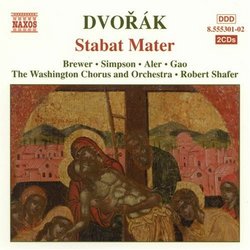| All Artists: Antonin Dvorak, Robert Shafer, Marietta Simpson, The Washington Orchestra, Christine Brewer, John Aler Title: Dvorák: Stabat Mater Members Wishing: 0 Total Copies: 0 Label: Naxos Release Date: 9/24/2002 Genre: Classical Styles: Opera & Classical Vocal, Historical Periods, Classical (c.1770-1830) Number of Discs: 2 SwapaCD Credits: 2 UPC: 747313530120 |
Search - Antonin Dvorak, Robert Shafer, Marietta Simpson :: Dvorák: Stabat Mater
 | Antonin Dvorak, Robert Shafer, Marietta Simpson Dvorák: Stabat Mater Genre: Classical
|
Larger Image |
CD Details |
CD ReviewsGrammy Award-Winning Washington Chorus Scores Another Hit! W. R. Stewart | Arlington, VA United States | 09/30/2002 (5 out of 5 stars) "Robert Shafer's Washington Chorus has scored another hit with their new recording of Antonin Dvorak's Stabat Mater. The CD also includes Dvorak's rarely heard Psalm 149, an interesting pairing of selections. Dvorak wrote his moving setting of Jacapone Da Todi's 13th-century poem in 1877, following the death of his daughter. Psalm 149 is a paean of praise ("Sing to the Lord a new song..."). The Stabat Mater is reminiscent of Verdi's great Requiem, yet brighter and more hope-filled. Dvorak's setting of Psalm 149 is almost bombastic in its exuberance, a tribute to nineteenth-century Victorian idiom. The diction of the 200-voice chorus is amazing, especially in the Latin of the Stabat Mater, but also in the setting of Psalm 149, sung in Czech. The breath-taking balance of the vocal parts is especially evident in the last movement of Stabat Mater, "Quando corpus morietur", where Dvorak, having built the music to a glorious climax, has the orchestra drop out and the massive chorus declaim the triumphant text a cappella. The choral singing itself is astonishing in its clarity, blend, and rich tonality. The passion and fervor that Dvorak put into his composition clearly comes through in the singers' execution of both pieces. Equally fine are the four soloists. What is particularly noticeable is how well matched these very powerful individual voices are. Their sensitive rendition of the solo parts is a suitable complement to the whole, always supporting and never overpowering. Shafer's direction of the entire enterprise is superb. His masterful control of the many forces under his baton is clear, yet never obtrusive. Shafer, like Shaw, humbly puts his many talents to the service of the music, creating an unforgetable experience for the listener. The confident hope in the resurrection that Dvorak skillfully crafted into this musical masterpiece shines forth from this performance as this listener has never heard it before. Whether you are familiar with these compositions or are hearing them for the first time, I think you will be very pleased to have included this CD in your collection." Dvorak's Stabat Mater ought to be done more often J Scott Morrison | Middlebury VT, USA | 10/12/2002 (5 out of 5 stars) "In fifty years of concert-going I've never heard a live performance of Dvorak's Stabat Mater. It is a mystery to me why this lovely piece is not more performed in the U.S. It is in the same mold as the Brahms Requiem which is performed very frequently. Perhaps the difference is that the Dvorak requires a strong quartet of solo singers, rather like the Verdi Requiem or the Beethoven Ninth Symphony. Still, it ought to be done more often. This recording, made by The Washington Chorus and Orchestra under Robert Shafer, and featuring soprano Christine Brewer, mezzo Marietta Simpson, tenor John Aler and bass Ding Gao, makes a good case for that notion.
Dvorak began his Stabat Mater in 1876, immediatly after the death of his newborn daughter, Josefa. But he laid it aside for a time. Then, within a year, his other two remaining young children died, one from smallpox, the other from accidentally drinking a phosphorus solution used for making matches. He returned to his sketches for the piece and it was premiered in 1880 in Prague. This Stabat Mater differs from the other most noted 19th-century Stabats (by Rossini, and by Verdi [from his Four Sacred Pieces]) in that it is symphonic in design, the others being more straightforward, even operatic. Also, the Verdi and Rossini pieces tend to focus more on the suffering of Jesus, rising to climaxes when that is mentioned in the sacred Latin text, while in Dvorak's treatment focuses more on the grief of Mary at the death of her son. Dvorak's approach keeps the focus on the human side of the events described. I have known this piece only from recordings, primarily those by Vaclav Talich and Rafael Kubelik, each of whom has world-class soloists (the likes of John Shirley-Quirk, Edith Mathis, Beno Blachut, Wieslaw Ochman. The present soloists are quite adequate, and in the case of Ding Gao, a young bass, quite a find. The chorus is obviously well-drilled and sings musically and with superb diction. Included on this disc is the nine-minute "Psalm 149," sung in Czech. The sound is good..." |

 Track Listings (7) - Disc #1
Track Listings (7) - Disc #1